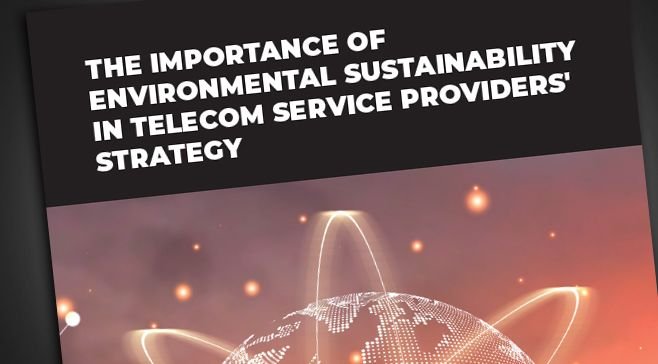EXECUTIVE SUMMARY
Sustainability is fast becoming a focal point of telecom service providers’ agendas. While sustainability entails many themes from climate change to equality and diversity, it is topics pertaining to telcos’ environmental impact that is most often addressed by service provider sustainability strategies. The CO2 footprint of the telecom industry is roughly 2% of the global footprint—similar to that of the airline industry—while 80% of e-waste is discarded, burned, or illegally traded, with telecom and IT equipment being a major contributor. By addressing their own energy deficiencies and by enabling sustainable solutions in other industries and ways of living in general, telecom service providers have the potential to have an impact on up to 15% of global CO2 emissions. Digitalization in general and broadband, in particular, can contribute by cutting transportation, creating gains in productivity and efficiency, and boosting economic growth for companies, individuals, and society as a whole. Many telecom service providers worldwide now embed sustainability strategies into their everyday business decisions. Many are aiming to become carbon neutral by 2050, and major telcos have set out specific 2030 targets for emissions, waste, and the sharing of renewable energy, which not only reduces a company’s own carbon footprint but enables customers and other industries to become more climate positive. Adopting an efficient sustainability strategy has major benefits for service providers’ revenue growth and operational performance. Some of the key benefits include the following:
- Lowering or even eliminating their carbon footprint by decreasing energy consumption through more efficient operations and transitioning to renewable sources of energy, while cutting costs as a result
- Having a positive impact on other industries and customers, enabling them to reduce their own environmental impact and opening new revenue streams for service providers
- Reputational benefits among consumers and business customers, leading to enhanced customer loyalty and long-lasting customer engagement as a recognition of a strong sustainability track record
- New business opportunities in areas that would previously not be available to telecom service providers such as venturing into renewable energy provision (e.g., teaming up with or investing in utility providers or even becoming utility providers themselves)
RECOMMENDATIONS
- Get serious and invested. Telecom service providers should not treat sustainability merely as a box-ticking exercise. Instead, they need to recognize it as a positive cost-saving and revenue-generating opportunity, embedding sustainability principles and policies at the core of their company values and culture.
- Be ambitious. Progressive, actionable targets are an essential component of a successful sustainability strategy that is rewarded by customers as well as investors, which are increasingly evaluating their investment decisions against companies’ environmental policies and targets.
- Be specific. Service providers need to carefully evaluate their individual conditions and set targets that reflect them. For example, there will be a different emissions baseline for an operator with a full-fiber network than for a service provider that is beginning to transition from a legacy copper network to fiber to the home (FTTH). The value case and potential value generation of sustainability targets will depend on the specifics of each company’s market conditions, operations, and infrastructure.
- Avoid greenwashing. Companies that set policies and targets that do only the bare minimum, set goals that are too modest or too far into the future, and use deceptive marketing to make themselves look environmentally friendly will lose in the long run. Consumers and investors are becoming more discerning and increasingly more knowledgeable. They will see through greenwashing attempts and take their business or investment elsewhere.
- Team up. In our interconnected world, it takes a team effort to deliver on sustainability targets. Service providers cannot achieve zero emissions and zero waste on their own, and they need to look for ways to team up with suppliers, customers, and investors to collaborate, co-innovate, and incentivize to bring about change. These can include alliances and coinvestment in renewable energy, teaming up with customers and incentivizing them to reduce e-waste and migrate to renewable energy, cocreating strategic roadmaps with vendors and other suppliers to decarbonize the supply chain, and finding new financial sources (such as green finance investments or green bonds) to fund the transformation.
- Make reporting mandatory and standardized. While many service providers have been active in developing sustainable strategies and practices, these are often isolated initiatives. The creation of a universal framework with standardized targets aimed specifically at telecom service providers would benefit the telecom industry. Mandatory reporting would speed up the adoption of sustainability strategies and expand and expedite the positive impact of these policies on the global environment.
Find more: https://worldbroadbandassociation.com/wp-content/uploads/2022/09/The-Importance-of-Environmental-Sustainability-in-Telecom-Service-Providers-Strategy-World-Broadband-Association-White-Paper.pdf





